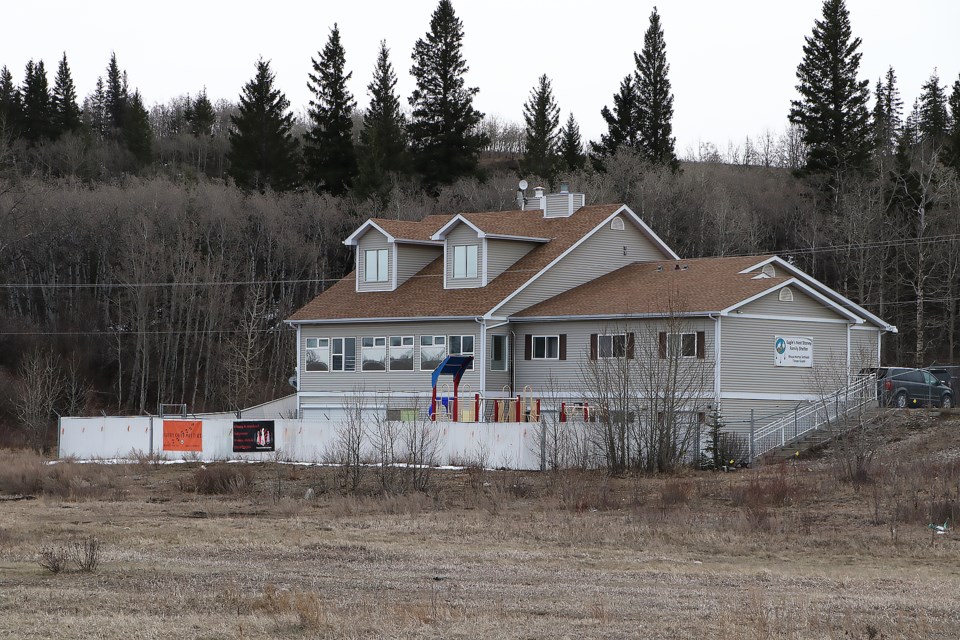ÎYÂRHE NAKODA – The Eagle’s Nest Stoney Family Shelter in Mînî Thnî is planning to break ground on a significant expansion of its facility this year, adding 12 new beds.
The shelter currently has four rooms to house women and families, in addition to a singles room, for a total of eight beds. The buildout adds five family rooms and a barrier-free room designed for mobility-impaired individuals.
Shelter director Laurie Patino said the design will add much-needed space for Indigenous women and families fleeing domestic violence.
“We know that there’s a significant percentage of Indigenous women who stay at shelters in the city. Many of those shelters are so busy, not only because of domestic violence, but also because of the housing and affordability crisis,” she said.
“There’s a lot of people struggling so there is absolutely a need for having more space here.”
Patino said the facility, which is located on Îyârhe Nakoda First Nation and is open 24 hours a day, seven days a week, is often full or near capacity and has been particularly busy in recent months.
The shelter is designed as a short-term emergency facility with stays averaging around three to six weeks, with considerations for longer stays dependent on domestic concerns unique to each individual or family’s situation.
It’s designed to offer cultural support and resources for those seeking culturally relevant assistance and guidance, including a smudge room. The expansion also includes the addition of a room to provide elder consultation, as well as a teen room, computer and craft space, a staff room and a laundry room. Renovations will also be made to existing bedrooms.
The shelter currently provides services including crisis intervention, danger assessment, goal setting, safety planning, outreach, advocacy and referrals. Counselling and elder guidance are also offered regularly at the shelter and in the community.
“Because we’re on the Nation, there’s women that really welcome that approach prioritizing First Nations women and because the programming includes cultural traditions and practices,” said Patino.
Ninety per cent of its employees are also Stoney women.
“Many of them speak Stoney, so being able to communicate with women who can better make them feel safe and comfortable, and having a facility where we know they’re not going to feel judged and they’re going to feel at home – because they are at home – that’s super important.”
Patino noted that with plans to double the size of the shelter, there will also be a need to double the number of staff. There are currently 15 employees.
Data from the Alberta Council of Women’s Shelters (ACWS) indicates domestic violence and abuse is increasing in frequency and severity.
Research also shows that Indigenous women and girls experience dramatically higher rates of violent victimization, especially at the hands of intimate partners, than non-Indigenous women and girls.
A 2014 general social survey by Statistics Canada, which captured self-reported information on peoples’ experiences of victimization, reported the rate of self-reported sexual assault of Indigenous women was more than triple that of non-Indigenous women at 11.3 per cent, compared to 3.5 per cent.
The same report found 10 per cent of Indigenous women self-reported having been assaulted by a current or former spouse within the last five years compared to three per cent of their non-Indigenous counterparts. It further noted Indigenous female victims of spousal violence were more likely to fear for their lives at 53 per cent, compared to non-Indigenous female victims at 29 per cent.
Those seeking help can get 24/7 support by calling or texting the Family Violence Info Line at 310-1818.
The 24-hour crisis line for the Eagle’s Nest Stoney Family Shelter is 403-881-2000. Stoney Tribal Security can be reached at 403-881-2791. If in immediate danger, call 911.
The Local Journalism Initiative is funded by the Government of Canada. The position covers Îyârhe (Stoney) Nakoda First Nation and Kananaskis Country.




